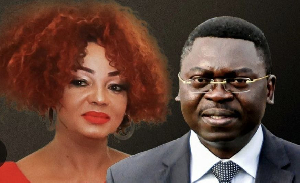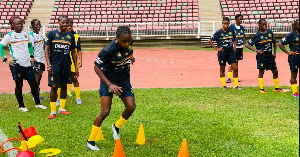Behind a red-netted fence, childcare worker Fanta Camara gives a bath to one-and-a-half years old Massidigbe in the Childcare Center of the Ebola Treatment Unit (ETU) in Nzerekore, in the forest area of southeastern Guinea. It is a good day for the little girl: her mother will be released today from the ETU, where she was being treated as an Ebola patient.
Massidigbe’s father died of Ebola and she has been under observation at the Childcare Center, which also serves as a temporary zone of observation. All the children here have lost at least one parent to Ebola. Usually, they can go home when the parent treated at the ETU is release and if they do not develop any symptoms of the disease after a couple of days.
The ETU in Nzerekore was opened on 2 December 2014 by the French medical organization, Alliance for International Medical Action (ALIMA), which is functioning under the umbrella of the United Nations Mission for Ebola Emergency Response (UNMEER). ALIMA has been running this 40-bed ETU with a team of 22 international and 218 national staff. Their project is financed by the European Commission (ECHO) and the private funds of ALIMA.
“During the last days we didn’t have any new admissions, and it keeps decreasing,” explains Guillaume Baret, Emergency Coordinator of ALIMA in Guinea. “So far, we had 86 admissions, 13 people recovered, 29 non-confirmed cases and 30 deaths due to Ebola.”
Three times a day, Fanta and the childcare team measure the temperatures of the children, as well as two mothers whose husbands and one of their children died of Ebola. Fanta continues to wash one child after the other. She has been working here since the opening of the ETU. Fanta is an Ebola survivor, treated here at the very same ETU in Nzerekore.
“I feel when you have survived Ebola, you have somehow the obligation to help other Ebola patients,” she says with a big smile. Her family was one of the first infected in this area. About 20 family members died, among which were her husband and two of her six children. “Now I am alone in charge of my family. So I am happy to work here because I need some income to pay the school fees for my kids.”
Simon Ghanamon arrives with his motorcycle at the Childcare Center. He is a medical biologist and supervisor of the Health Promotion Section at the ETU. Simon was a key figure in the launch of the Center and the temporary observation zone.
“We had many cases where family members of Ebola victims didn’t show symptoms immediately. Some tested positive only after the fourth test. They went back to their village and developed symptoms a couple of days later. The entire family and community got infected. In order to avoid this, we are offering family members to stay here for 21 days.
Food and beds, as well as phones and phone cards, are provided by the ETU.” The ETU is a 10-minute walk from the Center. Some of the 12 Ebola patients currently under treatment are allowed family visits in a designated area. They talk to each other over the red-netted fence, kept at a minimum of two meters distance to prevent transmission of the virus.
The patients’ health conditions are improving. Since 26 December 2014, they have been receiving a new anti-viral drug called Favipiravir, made by a Japanese firm. Here, and at the ETU in the nearby town of Gueckedou run by MSF, it is the first time the drug is being evaluated clinically in a cohort of humans who have contracted Ebola.
Initiated within the World Health Organization framework for research on Ebola, the study protocol was subject to rigorous review and was approved by the Guinean Ministry of Health, the National Committee to Fight Ebola and ethics committees in Guinea and France. Risks and benefits of the drug are clearly explained to patients or their representative in their native language. The Belgian laboratory B-FAST has partnered with ALIMA to provide diagnostic tests required for the care of Ebola patients and additional studies related to the trial.
“I am spending my ninth day here at the ETU, I am feeling much better. It was terrible, I had pain all over, I vomited and had diarrhea. But my last test was negative,” says Jacques Loua happily. Before he himself became a patient, he had brought his wife and his son to this ETU. His wife died a few days ago. Now Jacques hopes that his 8-year-old son Felix will get better soon. His childcare worker is 26 year old Kémo Camara, also an Ebola Survivor of this ETU. “It was difficult for Felix the last days. But slowly he is getting better.”
Kemo, a trained nurse, got infected when he was treating his brother, who eventually died of Ebola. When Kemo discovered the first symptoms on his body, the Guinean Red Cross came to pick him up from his village Saadou, 60 kms from Nzerekore. Kemo was treated for 13 days here at the ETU where he is working now.
Going through Ebola was hard. Nevertheless, he remains determined and passionate to help others. Through the mask on his face he is talking about his future endeavors. “I would like to work again as a nurse and help sick people.”
Opinions of Thursday, 15 January 2015
Auteur: Cameroon Tribune















